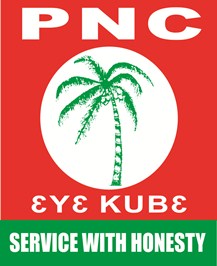
The New Patriotic Party (NPP) is a centre-right and liberal conservative party in Ghana. Since the democratization of Ghana in 1992, it has been one of the two dominant parties in Ghana politics; its leading rival being the centre-left National Democratic Congress (NDC). John Kufuor of the NPP was President of Ghana from 2001 to 2009. At the elections held on 7 December 2004, the party won 129 out of 230 seats. The NPP candidate was Kufuor, who was re-elected as President with 52.75% of the vote. The New Patriotic Party symbol is the African elephant and the New Patriotic Party colors are red, white, and blue.

Elections in Ghana gives information on election and election results in Ghana.
The National Convention Party (NCP) is a political party in Ghana that existed between 1992 and January 1996.

The People's National Convention is a political party in Ghana.
The National Reform Party is a political party in Ghana. It was founded in 1999 by a splinter group from the National Democratic Congress (NDC).

The Parliament of Ghana is the legislative body of the Government of Ghana.

The Provisional National Defence Council (PNDC) was the name of the Ghanaian government after the People's National Party's elected government was overthrown by Jerry Rawlings, the former head of the Armed Forces Revolutionary Council, on 31 December 1981. It remained in power until 7 January 1993. In a statement explaining the coup d'état, Rawlings explained that a "holy war" was necessary due to the PNP's failure to provide effective leadership and the collapse of the national economy and state services.

General elections were held in Ghana on 7 December 2000, with a second round of the presidential election on 28 December. The presidential elections resulted in a victory for John Kufuor of the New Patriotic Party (NPP), whilst the NPP also won the most seats in the parliamentary elections.

The Ghanaian parliamentary election was held on 29 August 1969. This was the first parliamentary election since the 1966 coup by the National Liberation Council which toppled the Nkrumah government, and the first relatively free election in the country's history.
The National Independence Party (NIP) is a defunct political party in Ghana. It was formed in 1992 in the run up to the inauguration of the Fourth Republic of Ghana. The party came to an end in 1993 following a merger with another Nkrumahist party.

The Democratic People's Party is a Ghanaian political party formed in 1992 after the ban on political party activity was lifted by the Provisional National Defence Council government of Ghana. The party claims to follow the Nkrumahist tradition along with the People's National Convention (PNC), Great Consolidated Popular Party (GCPP), National Reform Party (NRP) and the Convention People's Party (CPP).

The United Ghana Movement is a political party in Ghana. The founder is Charles Wereko-Brobby, formerly a leading member of the New Patriotic Party.

General elections were held in Ghana on 7 December 2008. Since no candidate received more than 50% of the votes, a run-off election was held on 28 December 2008 between the two candidates who received the most votes, Nana Akufo-Addo and John Atta Mills. Mills was certified as the victor in the run-off election on January 3, 2009, by a margin of less than one percent. It is to date the closest election in Ghanaian history.
Albert Kwadwo Adu Boahen was a Ghanaian academic, historian, and politician. He was an academic at the University of Ghana from 1959 to 1990, since 1971 as a professor. As a politician, he notably was a candidate in the 1992 Ghanaian presidential election, representing the main opposition New Patriotic Party.

A referendum on a new constitution was held in Ghana on 28 April 1992. The main issues were the reintroduction of multi-party politics and the division of powers between the president and parliament.

The Electoral Commission of Ghana is the official body in Ghana responsible for all public elections. Made up of seven members, its independence is guaranteed by the 1992 Ghana constitution. The current commission was established by the Electoral Commission Act of 1993. Kwadwo Afari-Gyan was the first substantive Chairman of the Commission from 1993-2015. In December 5,2018 the Electoral commission chaired by Jean Adukwei Mensah reverted to the old logo Eagles with coat of arms after the controversy over the new logo








